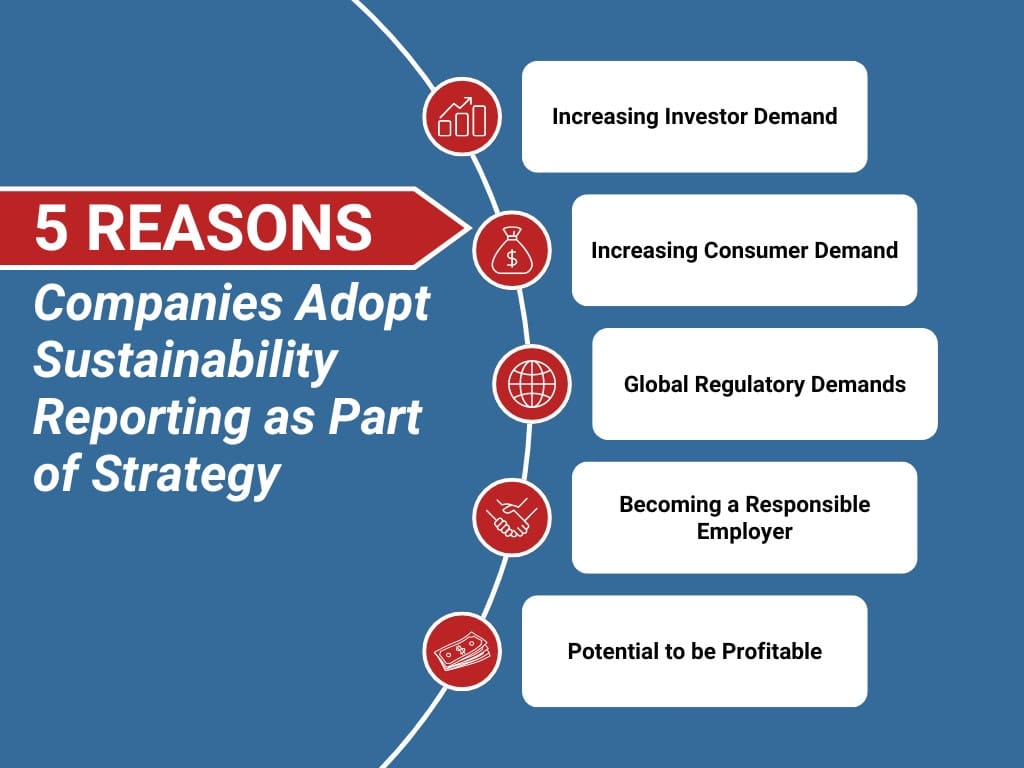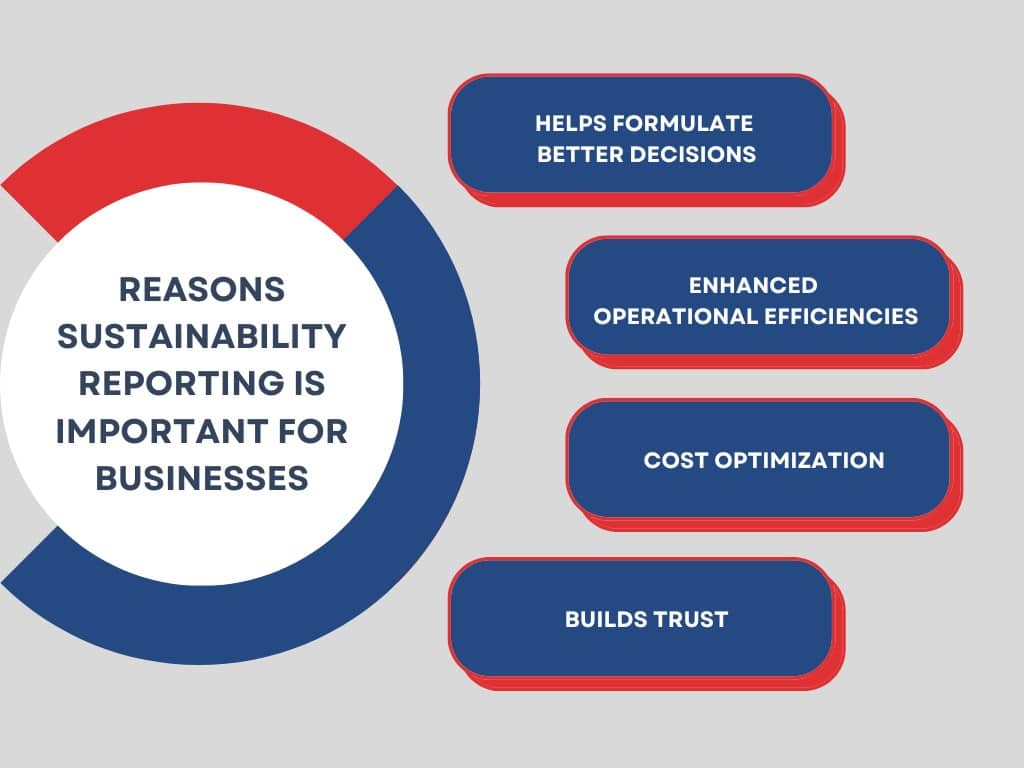Importance of Sustainability Reporting for Big Companies

Importance of Sustainability Reporting for Big Companies
Big companies are adopting sustainability reporting as a part of the strategy: Know about the growing importance of sustainability practices for businesses
- Authors
- Last Updated
- Tags
- Last Updated
- Tags
Share
Table of Contents
- Authors
- Last Updated
- Tags
Businesses today are not just evaluated based on their financial performance. Following sustainability practices and submitting sustainability reports are weighed equally important by stakeholders, especially clients and investors. Hence, sustainability reporting with a focus on ESG has gained prominence as businesses are now reporting on the environmental, social and governance (ESG) aspects. Sustainability reporting standards cover the impact of business on the environment and the steps a company takes to reduce its carbon footprint, conserve resources and improve its reputation and market trust.
According to a research by the United Nations Global Compact (UNGO), about 80% of the senior executives believe that sustainability is essential to have a competitive edge in today’s market. This shows the importance of sustainability reporting which encourages organizations to be transparent. Providing accurate information increases trust among stakeholders which also improves the company’s reputation. Moreover, the aim of the United Nations Global Compact (UNGC)is to accelerate the global impact of businesses by following ten principles and delivering Sustainable Development Goals (SDGs) to companies that support change.
The UN Global Compact (UNGC) supports companies to do the following:
a. Align business strategies and operations with ten principles on labor, environment, human rights and anti-corruption.
b. Broaden societal goals like UN Sustainable Development Goals emphasizing collaboration and innovation.
Before the World Economic Forum Sustainable Development Impact Meetings 2023, the forum had announced that 158 companies have included stakeholder metrics in their reporting materials. This included annual reports and sustainability reports. Since January 2021, more than 160 companies have showcased their support for stakeholder metrics. Some of the companies that have adopted this approach include Accenture, Bank of America, HSBC Holdings, Hyundai Motor Company, IBM, Mastercard, Nestlé, PayPal, Reliance Industries, Siemens, Unilever and Yara International among others. Case studies from the companies reporting on stakeholder metrics show how non-financial reporting drives transformation on company’s sustainability efforts. While a lot is being discussed about sustainability practices and the need for companies to be transparent about their initiatives, in this blog, we look at the importance of sustainability reporting for big companies in India.
Reasons Big Companies are Adopting Sustainability as a Part of Strategy

1. Increasing Investor Demand
Investor pressure is one of the significant factors encouraging sustainability practices and reporting. Research by top companies says that their investors consider ESG factors before making their decisions, like considering an investment.
2. Increasing Consumer Demand
The demand for sustainable products has increased in recent times, especially from the millennials and Gen-Z. Studies say that new consumers are willing to spend more on sustainable products, encouraging brands to be environmentally conscious. With the demand for sustainable practices increasing, most top companies have now embedded it into their strategies. From the current rising trends, it is evident that the future society will demand more transparency to garner trust making sustainability reporting a key part of business activities.
3. Global Regulatory Demands
The Paris Climate Agreement has advised governments to be stricter on matters of sustainability. Sweden and Germany have legally binding net zero emissions targets for 2045, while the UK, Canada, Japan and some other countries have a 2050 net zero commitment. In India, SEBI has mandated top 1000 listed companies to file a Business Responsibility and Sustainability Report (BRSR). This aligns with the country’s goal of achieving net zero target by 2070.
4. Becoming a Responsible Employer
Disclosing sustainability practices helps build trust and encourages a company to follow environment conscious practices. With sustainable practices becoming popular and being the need for the hour, young employees consider it an important factor to join a workplace. Companies are also aware of the factor and are consciously drafting strategies to attract top talent. Companies not focusing on this factor can lead to losing talent to competition.
5. Potential to be Profitable
As more companies share their sustainability reports, it helps create the need to be responsible. With more businesses following healthy practices, we can dream of a better planet soon. According to studies, sustainability reduces costs and can increase profits significantly. A study by Science Daily says, employees who work for companies that prioritize sustainability are 16% more productive than employees at companies with low sustainability practices.
Reasons Sustainability Reporting is Important for Businesses

1. Helps Formulate Better Decisions
Sustainability reporting helps in quick and effective decision-making process. It lets companies reduce risk across the supply chain. This can also reduce waste generation and result in cost savings.
2. Enhanced Operational Efficiencies
Once businesses have an idea of the impact of their sustainability activities, it lets them plan better for the future. Companies can achieve operational efficiency with strategies to optimize their resources, talent and supply chain.
3. Cost Optimization
Corporate sustainability reporting highlights the impact areas of business. It gives a clear picture of the places that require investments and the areas where the flow of funds should be restricted. This helps companies to optimize costs and use capital for new initiatives.
4. Builds Trust
Sustainability Reporting helps build trust among stakeholders. It increases transparency and promotes a sense of commitment and accountability.
Conclusion
By submitting your sustainability report, your company is disclosing its intention to include sustainable practices and showcasing the practices that are already being followed. This practice improves stakeholder trust and your organization’s reputation in the market in many ways. With governments and global unions issuing various norms to tackle social issues like global warming and climate change, as a business, sustainability reporting helps you to be a part of the global impact.
Why Choose InCorp Advisory?
InCorp Advisory houses subject matter experts spanning Chartered Accountants and Social Impact Assessors. We are a team of professionals with experience in managing Sustainability Reporting for clients from different industries. If you have any questions or require assistance regarding our process, please write to us at info@incorpadvisory.in or reach out to us at (+91) 77380 66622.
Authored by:
InCorp Global
Frequently Asked Questions on Sustainability Reporting
Why is sustainability reporting important to companies?
Sustainability reporting is an important process in which companies disclose their impact on the environment, society and the economy. This process helps companies become more transparent, make more thoughtful decisions towards their stakeholders and reduce risks across processes or supply chains. This helps optimize costs and resources and yield better results.
What is the major difference between ESG and sustainability reporting?
Sustainability is a universal term where an organization defines how they want to make their business more sustainable, by reducing negative ESG impact. Environmental, social, and governance (ESG) is a framework used to define sustainability in a globally accepted framework. ESG framework helps companies measure the ESG performance of a company in a comparable manner, while sustainability is a principle universal set that covers responsible business practices.
What are the concepts involved in sustainability reporting?
Sustainability reporting broadly involves disclosing a company's environmental, social, and governance (ESG) impacts, mitigation and goals. The report also communicates the company's progress and initiatives to reach those goals. It is a tool used for gathering sustainability information for the management process, and to communicate it to stakeholders like employees, shareholders, customers, local communities, NGOs, investors or financial analysts.
Why is sustainability reporting important to companies?
Sustainability reporting offers various advantages, including better risk profile, reducing cost of capital, efficient decision-making, and increased trust and transparency. Today, businesses are not just gauged based on their financial stability but sustainable practices also, making it a very important business strategy.
What is the framework of sustainability reporting in India?
In India, the BRSR framework is an important reporting framework for companies that wish to disclose their sustainable practices. It is developed by the Securities Exchange Board of India (SEBI). The BRSR reporting framework includes three sections like General Disclosures, Management and Process Disclosures, and Principle-wise Performance Disclosures.
Sustainability reporting is an important process in which companies disclose their impact on the environment, society and the economy. This process helps companies become more transparent, make more thoughtful decisions towards their stakeholders and reduce risks across processes or supply chains. This helps optimize costs and resources and yield better results.
Sustainability is a universal term where an organization defines how they want to make their business more sustainable, by reducing negative ESG impact. Environmental, social, and governance (ESG) is a framework used to define sustainability in a globally accepted framework. ESG framework helps companies measure the ESG performance of a company in a comparable manner, while sustainability is a principle universal set that covers responsible business practices.
Sustainability reporting broadly involves disclosing a company's environmental, social, and governance (ESG) impacts, mitigation and goals. The report also communicates the company's progress and initiatives to reach those goals. It is a tool used for gathering sustainability information for the management process, and to communicate it to stakeholders like employees, shareholders, customers, local communities, NGOs, investors or financial analysts.
Sustainability reporting offers various advantages, including better risk profile, reducing cost of capital, efficient decision-making, and increased trust and transparency. Today, businesses are not just gauged based on their financial stability but sustainable practices also, making it a very important business strategy.
In India, the BRSR framework is an important reporting framework for companies that wish to disclose their sustainable practices. It is developed by the Securities Exchange Board of India (SEBI). The BRSR reporting framework includes three sections like General Disclosures, Management and Process Disclosures, and Principle-wise Performance Disclosures.
Share
Share







































































